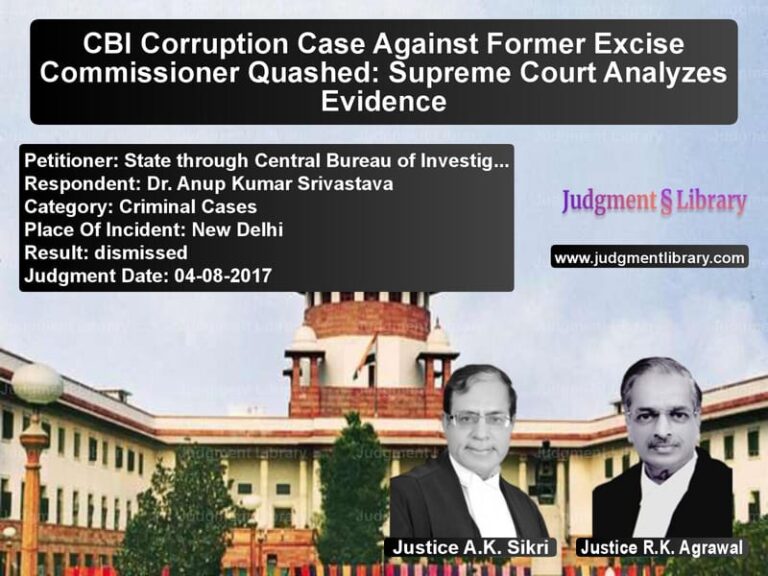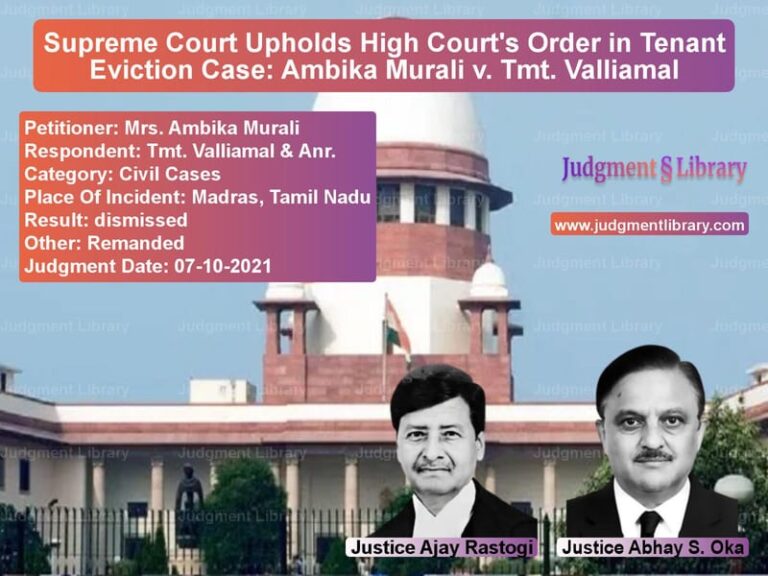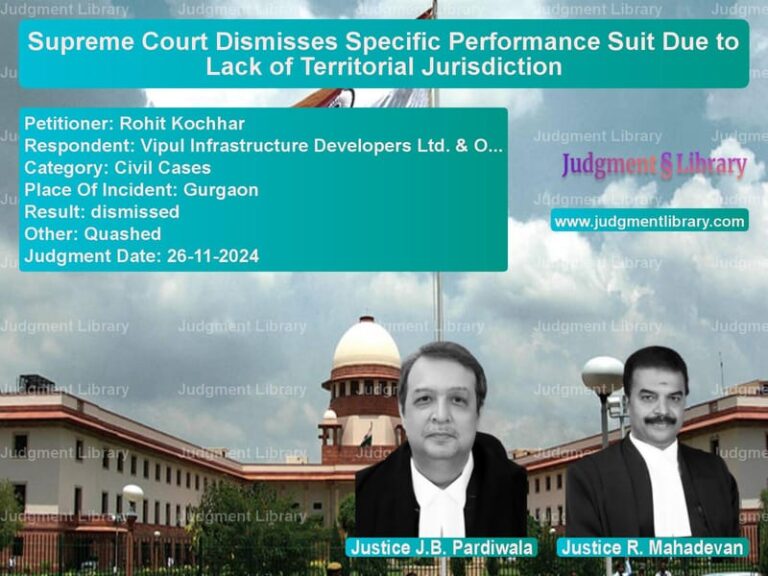Retirement Age of AYUSH Doctors: Supreme Court’s Ruling on Autonomous Body Employees
The Supreme Court of India recently ruled in the case of Central Council for Research in Ayurvedic Sciences (CCRAS) & Anr. vs. Bikartan Das & Ors., addressing the issue of retirement age for doctors working under autonomous bodies affiliated with the Ministry of AYUSH. The primary dispute revolved around whether an employee of the CCRAS, an autonomous body, was entitled to the enhanced retirement age of 65 years applicable to AYUSH doctors under the Central Government. The case raises significant questions regarding service rules, employment policies, and the extent of judicial intervention in policy decisions.
Background of the Case
The appellant, CCRAS, an autonomous research body under the Ministry of AYUSH, had employed Dr. Bikartan Das as a Research Assistant in 1985. Over the years, he was promoted to the post of Assistant Director (AYUSH). The dispute arose when the Government of India, through a 2017 Cabinet decision, enhanced the retirement age of AYUSH doctors under the Ministry to 65 years. However, a subsequent clarification issued by the Ministry explicitly excluded autonomous bodies like CCRAS from this benefit.
Dr. Das, upon reaching the age of 60 in April 2018, challenged his retirement, arguing that he was entitled to the enhanced retirement age since his role involved treating patients similar to AYUSH doctors under the Ministry. His plea was rejected by the Central Administrative Tribunal (CAT), Cuttack Bench, leading him to approach the Orissa High Court, which ruled in his favor. The High Court’s decision was then challenged by CCRAS in the Supreme Court.
Read also: https://judgmentlibrary.com/supreme-court-upholds-dismissal-of-army-personnel-for-overstaying-leave/
Key Legal Issues
- Does the retirement age enhancement apply to employees of autonomous bodies under the Ministry of AYUSH?
- Can the Central Government selectively apply service benefits to some doctors while excluding others under autonomous institutions?
- Should the court interfere in policy decisions related to service conditions?
Petitioner’s (CCRAS) Arguments
- CCRAS is an autonomous body governed by its own service rules, as per its Bye-Laws, and employees cannot claim parity with Central Government employees.
- Clause 34 of the Bye-Laws explicitly states that the retirement age is determined by the Governing Body of the organization, which had fixed it at 60 years.
- The Cabinet decision of 2017 enhancing the retirement age of AYUSH doctors was meant only for those directly under the administrative control of the Ministry of AYUSH.
- A clarification issued on October 31, 2017, explicitly excluded research councils and national institutes under the Ministry from this benefit.
- The High Court erred in equating research officers with medical doctors working in CGHS hospitals.
- The Tribunal rightly held that Fundamental Rules (FR 56(bb)) do not apply to autonomous institutions unless explicitly adopted by their governing bodies.
Respondent’s (Dr. Bikartan Das) Arguments
- Dr. Das argued that he was an AYUSH doctor, possessing a Bachelor of Ayurvedic Medicine and Surgery (BAMS) degree, and had been performing clinical duties in Outpatient and Inpatient Departments (OPD and IPD).
- He was drawing Non-Practicing Allowance (NPA), indicating that he was treated as a medical practitioner.
- Clause 34 of the Bye-Laws states that retirement rules applicable to Government of India employees should apply to CCRAS employees.
- The exclusion of autonomous bodies from the 2017 retirement age enhancement was discriminatory and violated Articles 14 and 16 of the Constitution.
- The Orissa High Court correctly held that since he was treating patients like an AYUSH doctor, he should be granted the benefit of the extended retirement age.
Supreme Court’s Analysis and Judgment
The Supreme Court reversed the Orissa High Court’s ruling and upheld the decision of the CAT, thereby reinstating the retirement age of 60 years for Dr. Das. The key observations of the Court were:
- Autonomous Bodies Have Separate Service Rules: The Court emphasized that CCRAS, as an autonomous body, had a separate governing structure, and the Cabinet decision on retirement age did not automatically apply.
- Cabinet Decision Must Be Explicit: Since the Union Cabinet decision did not mention autonomous bodies, they could not be included unless explicitly stated.
- Interpretation of Bye-Laws: Clause 34 of the Bye-Laws provides that Government of India rules apply unless otherwise decided by the Governing Body. Since the Governing Body had not adopted the enhanced retirement age, it was not applicable.
- No Automatic Parity with Government Employees: The Court held that employees of autonomous institutions cannot demand the same service benefits as Central Government employees unless there is a policy decision explicitly stating so.
- Judicial Overreach in Service Matters: The Court reiterated that policy decisions related to service conditions should be left to the executive, and courts should not interfere unless there is a clear violation of fundamental rights.
Impact and Legal Precedent
This ruling has far-reaching implications:
- Clarity on Retirement Policies: It establishes that retirement age policies for autonomous institutions must be explicitly decided by their governing bodies.
- Limits on Judicial Intervention: The ruling reinforces that courts should not interfere in administrative decisions unless there is clear arbitrariness or discrimination.
- Impact on Other Autonomous Bodies: Employees of other autonomous organizations cannot automatically claim the benefits granted to government employees unless their governing body adopts such policies.
- Guidelines for Service Conditions: The case clarifies the distinction between employees under direct government control and those working in autonomous institutions.
Conclusion
The Supreme Court’s decision in CCRAS vs. Bikartan Das sets a strong precedent on service rules governing autonomous institutions. It reiterates the principle that autonomous bodies operate under distinct administrative frameworks and that government service benefits do not automatically extend to them. The judgment also limits judicial overreach in policy matters, reinforcing the principle that courts should not interfere in service conditions unless fundamental rights are at stake. This ruling serves as an important benchmark for future disputes concerning employment benefits in autonomous organizations.
Petitioner Name: Central Council for Research in Ayurvedic Sciences (CCRAS).Respondent Name: Bikartan Das.Judgment By: Justice J.B. Pardiwala.Place Of Incident: Orissa.Judgment Date: 16-08-2023.
Don’t miss out on the full details! Download the complete judgment in PDF format below and gain valuable insights instantly!
Download Judgment: central-council-for-vs-bikartan-das-supreme-court-of-india-judgment-dated-16-08-2023.pdf
Directly Download Judgment: Directly download this Judgment
See all petitions in Pension and Gratuity
See all petitions in Public Sector Employees
See all petitions in Employment Disputes
See all petitions in Judgment by J.B. Pardiwala
See all petitions in allowed
See all petitions in supreme court of India judgments August 2023
See all petitions in 2023 judgments
See all posts in Service Matters Category
See all allowed petitions in Service Matters Category
See all Dismissed petitions in Service Matters Category
See all partially allowed petitions in Service Matters Category







